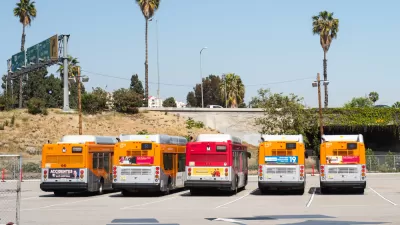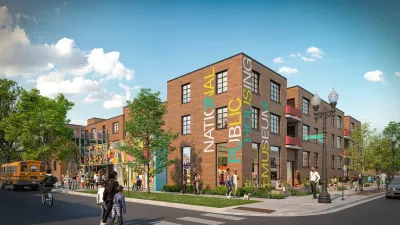With urban populations growing, an interesting phenomenon is spreading in cities across the U.S. - the rise of the (often congested) reverse commute. It brings with it new challenges, like how to provide transit riders with last mile connections.
"Over the past couple of decades, suburban job growth has exploded, but in recent years, there's also been a renaissance in urban living, especially among young professionals. The result: In some cities, traffic on the reverse commute is as congested as or worse than traffic going into the city," reports David Schaper in the latest piece in NPR's special series on U.S. commutes.
In Chicago, this has resulted in "surging population growth" along rail lines, "especially those leading to the suburbs," he adds.
"'It's an opportunity, but it also presents a big challenge for the transit market,' says Leanne Redden, who oversees planning for the Regional Transportation Authority of Chicago. Redden says the challenge is getting reverse commuters the last couple of miles from suburban stations to the sprawling corporate campuses and office parks along the highways."
Shuttle buses, van pools, and car and bike sharing are among the solutions being put forth for making the "last mile" connection.
FULL STORY: Reverse Commutes Now Often A Daily Slog, Too

Alabama: Trump Terminates Settlements for Black Communities Harmed By Raw Sewage
Trump deemed the landmark civil rights agreement “illegal DEI and environmental justice policy.”

Study: Maui’s Plan to Convert Vacation Rentals to Long-Term Housing Could Cause Nearly $1 Billion Economic Loss
The plan would reduce visitor accommodation by 25% resulting in 1,900 jobs lost.

Planetizen Federal Action Tracker
A weekly monitor of how Trump’s orders and actions are impacting planners and planning in America.

Wind Energy on the Rise Despite Federal Policy Reversal
The Trump administration is revoking federal support for renewable energy, but demand for new projects continues unabated.

Passengers Flock to Caltrain After Electrification
The new electric trains are running faster and more reliably, leading to strong ridership growth on the Bay Area rail system.

Texas Churches Rally Behind ‘Yes in God’s Back Yard’ Legislation
Religious leaders want the state to reduce zoning regulations to streamline leasing church-owned land to housing developers.
Urban Design for Planners 1: Software Tools
This six-course series explores essential urban design concepts using open source software and equips planners with the tools they need to participate fully in the urban design process.
Planning for Universal Design
Learn the tools for implementing Universal Design in planning regulations.
Caltrans
Smith Gee Studio
Institute for Housing and Urban Development Studies (IHS)
City of Grandview
Harvard GSD Executive Education
Toledo-Lucas County Plan Commissions
Salt Lake City
NYU Wagner Graduate School of Public Service




























